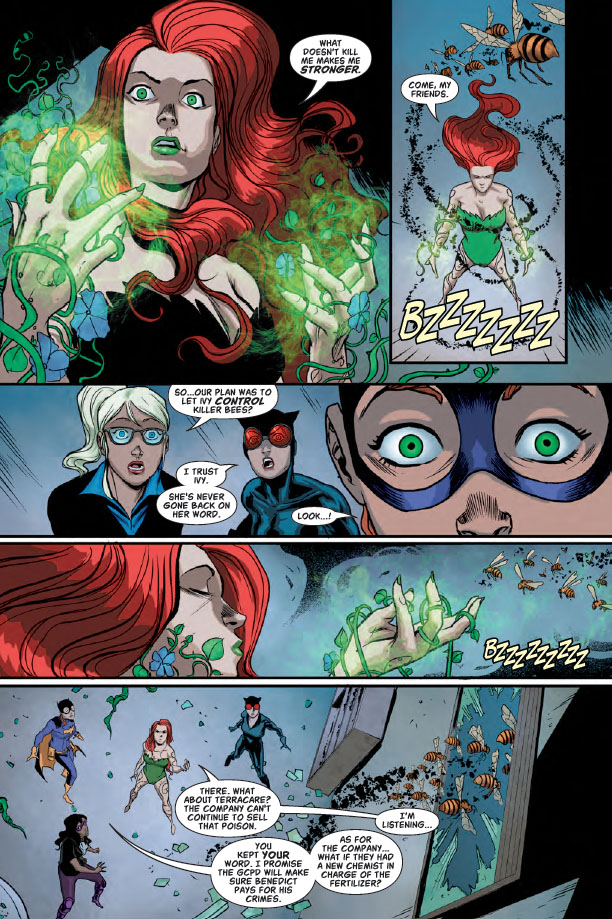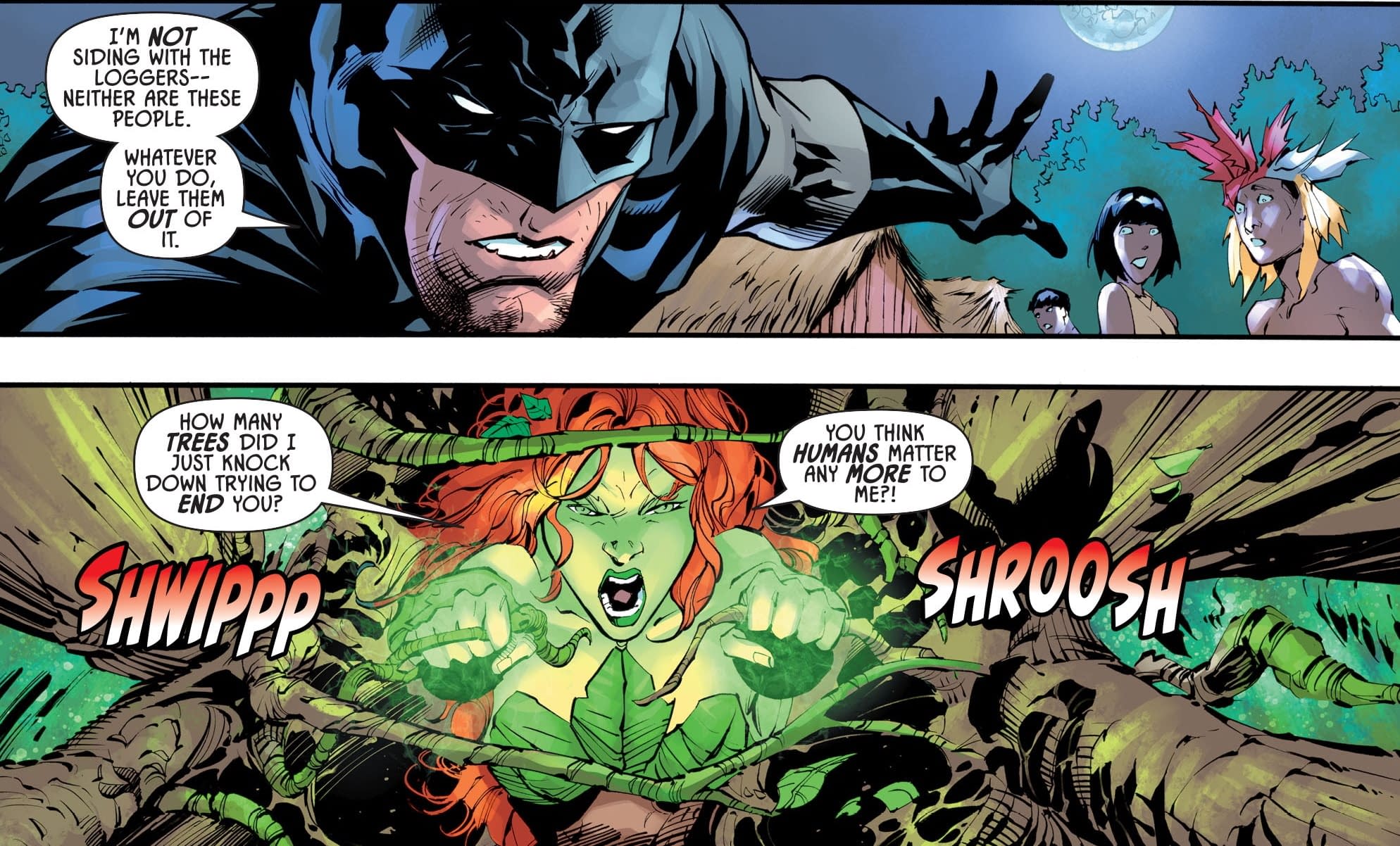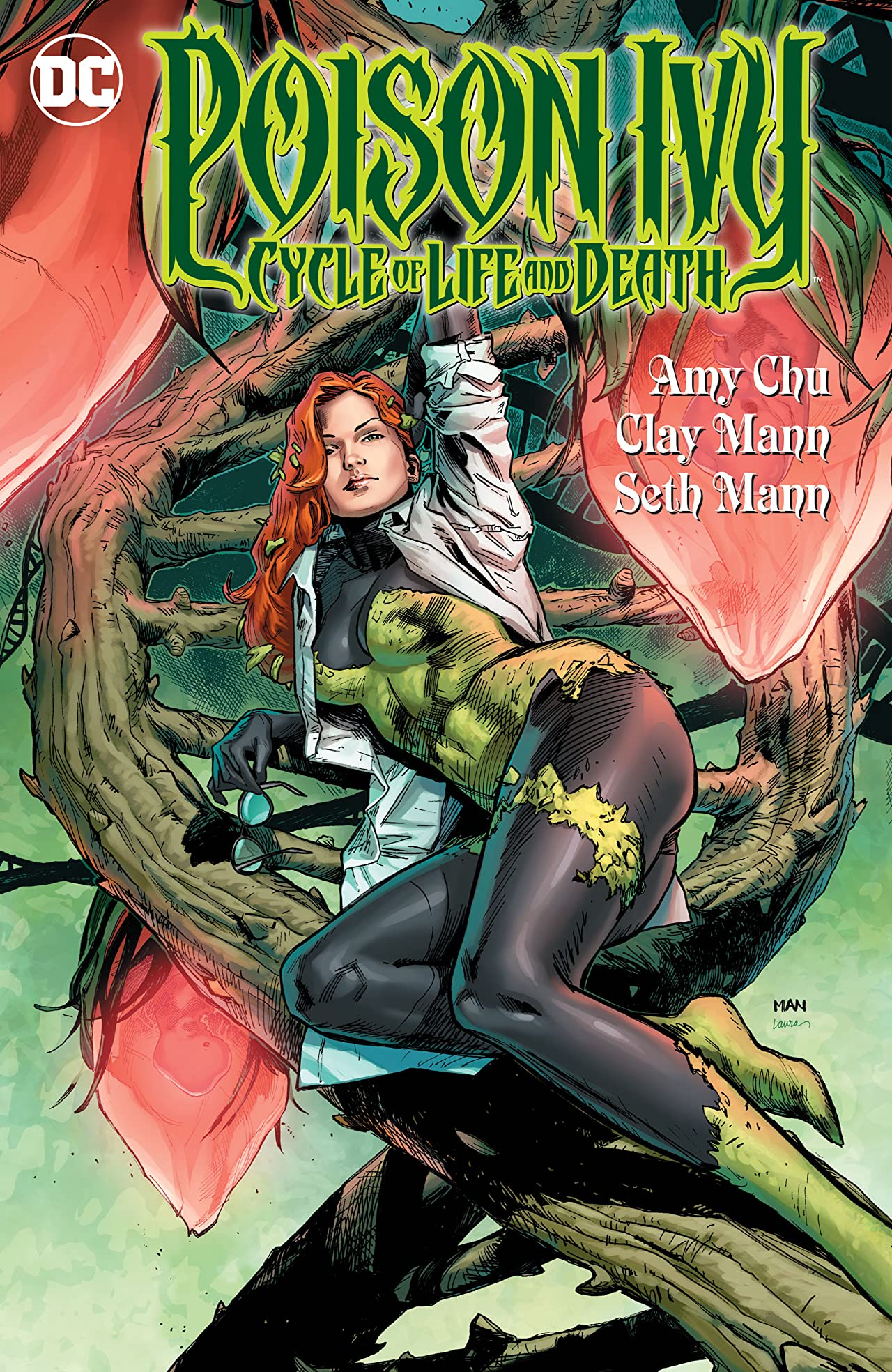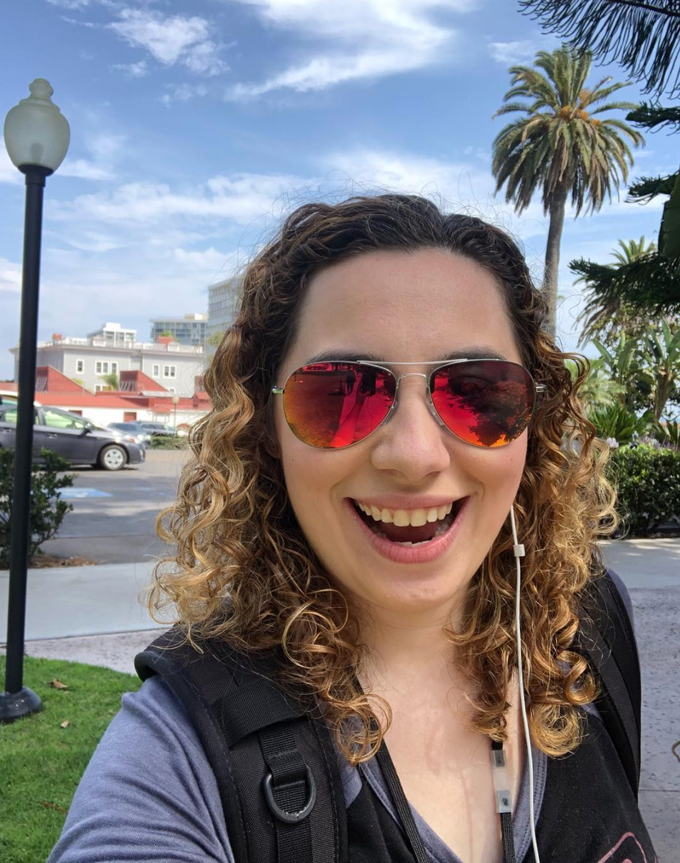Poison Ivy - villain? hero? Harley Quinn's girlfriend?
Looking at DC's dissonant approach to Poison Ivy
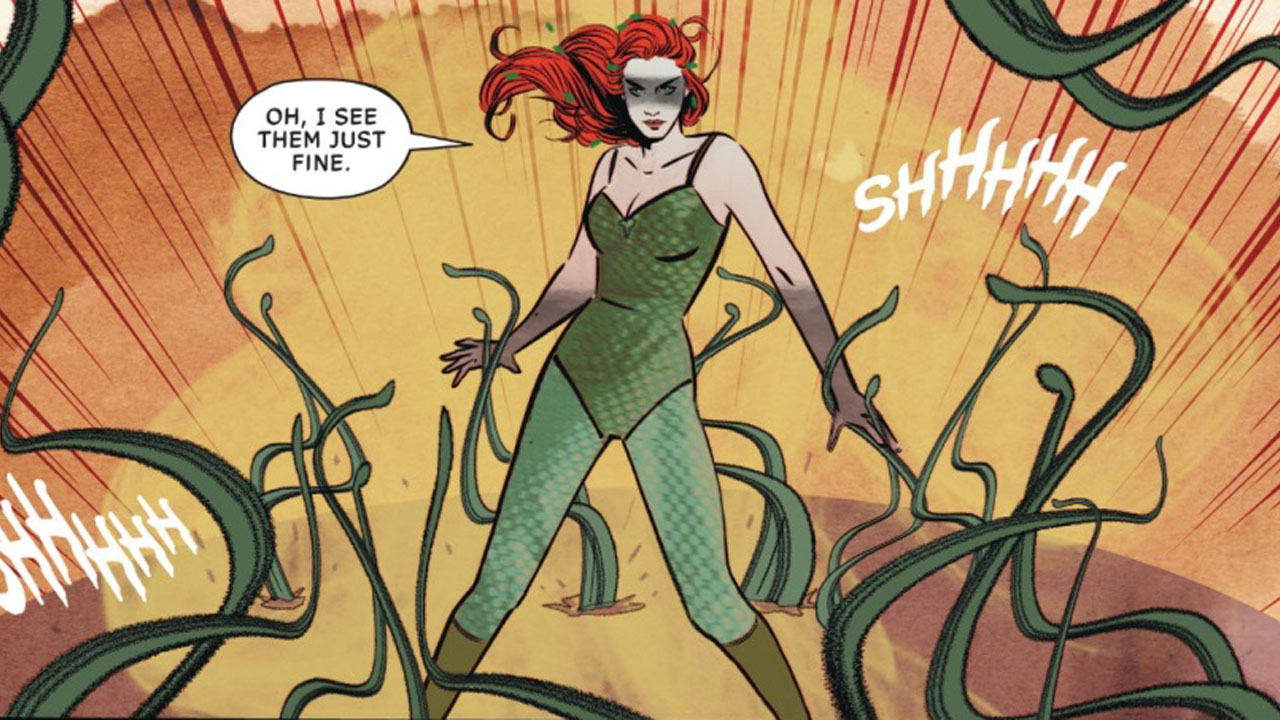
"Right now, the most underrated character at DC Comics is Poison Ivy," fan-favorite writer Gail Simone tweeted last year. "When she is given a proper spotlight, she steals every scene. Readers love her. Why she doesn't get the treatment of Catwoman and Harley, I have no idea."
Perhaps part of the issue of DC doesn't seem to have an idea if she's anti-hero or villain, and lover to Harley Quinn, or just a really good friend.
Over the last several years, Poison Ivy's sporadic appearances in DC titles portray her sometimes as a spotlight villain, sometimes as a guest star, and sometimes as a background figure dancing at a party (see Dark Nights: Death Metal #7). And throughout these appearances, her true role in the DC Universe has been unclear - with conflicting narratives and uneven portrayals about who and what she is that seem in some cases dated, and in others pejorative.
Since she graduated from 'simple' Bat-villain to a more multi-faceted character in the late '90s, Ivy has been shipwrecked in a liminal state which is both brimming with possibility and at the same time teeming with ambiguity. While other former DC villains like Deathstroke, Catwoman, and Harley Quinn (among others) have graduated to more heroes (and anti-heroic) roles and by extension, stars of their own titles, Poison Ivy remains stuck in a limbo in which she's not quite a full-time villain but hasn't quite completed a full hero turn, leading to confusion.
In the 'Rebirth' era series Batgirl and The Birds of Prey, Ivy is at her most heroic - including creating a serum to save the men of Gotham from dying due to a fast-spreading disease.
"To us, that was so important because she can be seen as the villain and giving her a heroic moment, I think, is important for hero or villain to understand that at the base level she is a human," series co-writer Julie Benson said at the time.
Long-time Batman writer Scott Snyder portrayed a very spirited version of Poison Ivy in 2017's All-Star Batman #7, and told Comic Vine he saw her as one of comics' most interesting characters.
"...because she's a villain, but she's a very redeemable villain who I think veers into heroism often and also has this power set that's out of control," Snyder said.
Writer Tom King portrayed her more on the villainous, vicious side during his recent Batman run - having her use Swamp Thing's the Green to take over Gotham City. King dug deeper, however, and suggested Ivy's seemingly outright evil, mustache-twirling plan to take over the world actually was rooted in the trauma she endured during a previous arc, 'The War of Jokes and Riddles.'
Get the best comic news, insights, opinions, analysis and more!
From Ivy's point-of-view she was saving the world.
Despite pockets of growth for the character and an increasing undercurrent of heroism, other stories such as appearances in Damage and Batman 100-Page Giant fell back on the no-holds-barred villainous Poison Ivy of years prior. And therein lies the problem. There seems to be no through-line in her narrative other than the whims of whoever is writing her on any given day.
And these seeming inconsistencies aren't limited to her moral compass. DC also can't seem to decide the exact nature of her relationships with Harley Quinn.
In Amanda Conner and Jimmy Palmiotti's popular, redefining run on Harley Quinn, they established the two women were in a romantic relationship - a relationship that picked up on and continued in the current DC Universe/HBO Max Harley Quinn animated series.
But then there are other titles like Harley Quinn and Poison Ivy in which they were seemingly like they were good friends than lovers. The solicitation to that series first issue reads, "Set after the events of Heroes in Crisis and smack in the middle of 'Year of the Villain,' it's a journey across the DC Universe that will change their friendship forever...if they live that long!"
In Conner and Palmiotti's Black Label Harley Quinn and The Birds of Prey, Poison Ivy and Harley Quinn had broken up, but as Black Label book it unclear if it's considered part of continuity.
In James Tynion IV's current Batman run, Harley Quinn has become a major player in the series but the writer has made only a few, brief references to her relationship with Ivy. In this series seem to still love each other, but for some off-panel reason aren't together.
Perhaps the de facto key Poison Ivy writer in recent years has been Amy Chu, who wrote the 2015 limited series Poison Ivy: Cycle of Life and Death. When asked about Poison Ivy's liminal state, Chu told Newsarama she sees both sides.
"I don't think of Ivy as either a hero or a villain. She's non-binary if you will... She has the capacity to be both," Chu says. "The point is, she has a different perspective which means she doesn't have the same moral compass that most humans have. I mean, to her we're all carbon, right? Cycle of life and death..."
On the immediate horizon, Poison Ivy seems to have planted herself (bad pun apologetically intended) in several places in the DCU - and consistently inconsistently, in some seemingly villainous roles, some seemingly heroic, and in others ambiguously.
A 'Queen Ivy' story thread is working through Tynion IV's current Batman run; she'll co-star in a short with Harley Quinn in a Valentine's Day-themed anthology called DC Love is a Battlefield; a short in the upcoming Batman: Urban Legend #1 will somehow address Ivy and Harley's on-again-off-again relationship status; and she'll star in an OGN titled Poison Ivy: Thorns.
Oh, and she's also been teased to appear in upcoming issues of the Catwoman ongoing.
All those threads are seemingly independent of one another, contributing to a vagarious state in 2021 that seems to be Poison Ivy's status quo.
Whatever that overarching direction ends up being, assuming there even is one, perhaps it will lay the groundwork for Poison Ivy getting that 'Catwoman and Harley treatment.'
All of these aforementioned Poison Ivy comics are available online as well as in print. Check out Newsarama's list of the best digital comics readers for Android and iOS devices.
Kat has been working in the comic book industry as a critic for over a decade with her YouTube channel, Comic Uno. She’s been writing for Newsarama since 2017 and also currently writes for DC Comics’ DC Universe - bylines include IGN, Fandom, and TV Guide. She writes her own comics with her titles Like Father, Like Daughter and They Call Her…The Dancer. Calamia has a Bachelor’s degree in Communications and minor in Journalism through Marymount Manhattan and a MFA in Writing and Producing Television from LIU Brooklyn.

